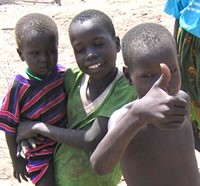Dinka, Central in South Sudan

Photo Source:
Keith & Jamie Lorenz
|
Send Joshua Project a map of this people group.
|
| People Name: | Dinka, Central |
| Country: | South Sudan |
| 10/40 Window: | No |
| Population: | 54,000 |
| World Population: | 54,000 |
| Primary Language: | Dinka, South Central |
| Primary Religion: | Ethnic Religions |
| Christian Adherents: | 14.00 % |
| Evangelicals: | 9.00 % |
| Scripture: | Portions |
| Ministry Resources: | Yes |
| Jesus Film: | Yes |
| Audio Recordings: | Yes |
| People Cluster: | Nilotic |
| Affinity Bloc: | Sub-Saharan Peoples |
| Progress Level: |
|
Introduction / History
The Central Dinka speak Dinka, South Central, a Nilotic language within the Eastern Sudanic branch of the Nilo-Saharan family. This language is indigenous to South Sudan in the Lakes State region, with smaller populations in Warrap and Unity states.Historically, the Dinka people originated from the Gezira region in present-day Sudan. They migrated southward over centuries due to slave raids, conflict, and environmental pressures. Their cultural heritage includes ties to the ancient Nubian kingdom of Alodia, and their traditions reflect a blend of Nilotic and Nubian influences.
What Are Their Lives Like?
The Central Dinka are transhumant agro-pastoralists, meaning they move seasonally with their cattle between riverine pastures and permanent settlements. Cattle are central to their economy, social structure, and spiritual life. They grow millet and other grains during the rainy season and rely heavily on livestock for food, trade, and cultural rituals.Their homes are traditionally built with wooden poles and thatched roofs. Communities are organized into autonomous political units based on clan and lineage. Despite modern pressures and displacement due to conflict, they maintain a strong cultural identity rooted in ancestral traditions and cattle-based livelihoods.
What Are Their Beliefs?
The Central Dinka are predominantly followers of African Traditional Religion, with a strong Christian minority. Their traditional beliefs include reverence for Nhialic, the creator god, and a pantheon of ancestral spirits. Rituals and sacrifices are common, especially in response to moral transgressions or life events.Even among Christians, traditional beliefs often remain influential, resulting in a syncretic blend of faith practices. Spiritual leadership is deeply respected, and priest-chiefs play a central role in community life.
What Are Their Needs?
Many Central Dinka Christians lack access to discipleship and sound biblical teaching. There is a need for spiritual renewal and leadership development. There is limited availability of Scripture and Christian materials in the South Central Dinka language.Medical services and schools are scarce, especially in rural and displaced communities. Many communities lack reliable sources of clean water, especially in refugee camps.Years of civil conflict have disrupted traditional life and caused widespread displacement.
Prayer Points
Pray for spiritual revival among the Central Dinka, that believers would grow in faith and biblical understanding. Ask God to raise up local leaders and evangelists who can disciple others and plant churches in areas that are unreached.Pray for healing and reconciliation in communities affected by tribal conflict and displacement.Intercede for access to clean water, healthcare, and education, especially in remote villages.Pray for the translation and distribution of Scripture and Christian media in the South Central Dinka language.Pray for missionaries and national pastors working in refugee camps and remote areas to be strengthened and encouraged.